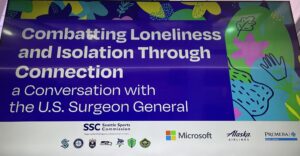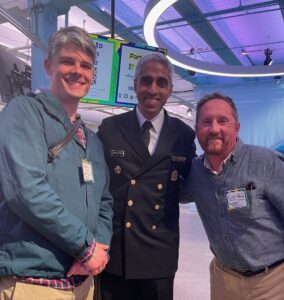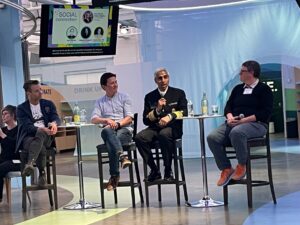Loneliness and isolation have become pervasive issues in our society, impacting mental health and well-being. On Wednesday, May 29th, Surgeon General Vivek Murthy visited Seattle to host discussions addressing this epidemic.

I had the opportunity to attend the event with Ben Wahl of Ryther, the place I first began my journey as a professional game master. The audience was filled with local community enthusiasts: nonprofit leaders, therapists, and organizers. Through two insightful panels, Murthy and esteemed guests explored how various industries and personal experiences can help us reconnect with each other. (Gaming was not mentioned! More on that in a future post!)

Panel 1: Industry Leaders on Community Building
The first panel featured Beth Barrett (SIFF), Benjamin Gibbard (Death Cab for Cutie, The Postal Service), and J. Kenji López-Alt (The Food Lab), discussing the roles of cinema, music, and food in fostering communal connections.

Impact of the Pandemic
Murthy opened with a discussion on how the COVID-19 pandemic affected their industries.
Beth Barrett spoke first, sharing how for many years communities had gathered around the cinema. It was a habit, she said, for groups to meet at the cinema and fill the time with surrounding activities. She reminisced about a time not long ago when teenagers would often meet at the mall to see a movie and spend the rest of the day together, often sharing food and discussion about both the film and their lives. As the pandemic has generally lifted, we haven’t yet rebuilt the habits we broke. We relied on the couch to watch movies during the pandemic, and we haven’t returned to the theater like we did before, she said.
J. Kenji López-Alt spoke next about how incredibly disruptive the pandemic was to the restaurant industry. As he said with a tone of sadness, sharing food is about sharing who you are and your culture. He mentioned that he was able to continue using food to connect with others during the pandemic as he was personally delivering food to those in need, and how valuable that personal contact was. He also began expanding his use of social media, primarily YouTube, to share his passion for food and cooking, now with a younger audience who is newly inspired to prepare food. His online social interactions were a respite from the loneliness during the pandmic, though not a replacement for in-person community.
Ben Gibbard spoke third, addressing the challenges of creating music as a band whose members live in different cities. The way they created music had to change, as they were no longer able to work through the creative process together in person. Throughout the panel he spoke mostly about his perspective as a music lover, not only as an artist. He spoke of the power of having a large audience of 1000 people at a music venue each watching the same performance, but each individually having their own subjective experience with the music. During these collective experiences heartbeats synchronize and people move together to the rhythms of the performance. This kind of powerful collective experience was not accessible during the pandemic.
Rebuilding Social Habits
Murthy then asked why people aren’t gathering as much for meals.
J. Kenji López-Alt humorously noted that while we once shared meals in restaurants, we now share photos of our food online. This shift to virtual sharing has impacted real-life experiences.
Beth Barrett followed with perhaps the most thought-provoking comment of the night. Building on her previous comment that she’d made about how we’d “broken the habit” of going to the cinema, she mentioned that “We now have to break the habits that kept us safe during the pandemic.”
Murthy then reflected on his experience as a doctoral student, how he and his student friends, as they were living on limited means, used to gather in their student housing to put music on the stereo and dance together. He appeared nostalgic for such a simpler time of communal gathering.
At this point Ben Gibbard interjected: “You can still do that!” All we need is someone to invite others, and for others to “say yes to stuff.” Music is always available, he said. We just think we’re too busy to enjoy ourselves.
“We also think others are too busy,” replied Murthy, to which Kenji replied that all groups of friends need ‘the inviter,’ and that if we aren’t sure who is the inviter for our friend group, perhaps that responsibility should fall on us.
The audience questions followed, which featured inquiries about how to expand our social circles (we should attend events that are designed for the purpose, like book clubs and film festivals with discussion components), and how we can use social media to our benefit instead of simply seeing it as the harbinger of our loneliness epidemic (we can use it to connect, but should take those connections offline in real-time).
Key Takeaways
Murthy outlined three crucial steps to combat loneliness:
- (Re)build Social Habits: Form new habits involving real-time interactions. Make it normal to regularly be with other people. Film, performance, and food are excellent ways to reconnect.
- Be the Inviter: Take initiative in organizing social events and inviting others.
- Just Say Yes: Embrace social opportunities, as we often regret missed experiences more than those we participate in.
Up Next: In our next post, we’ll delve into the second panel discussion featuring Seattle sports icons Bethany Balcer and Ray Roberts, who shared their personal journeys and insights on overcoming loneliness and isolation in the world of professional sports. In a follow-up, we’ll explore how games and game-based mentorship programs can provide a respite and a remedy for the loneliness so many feel.
